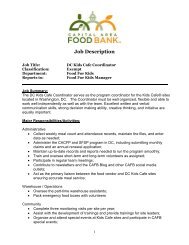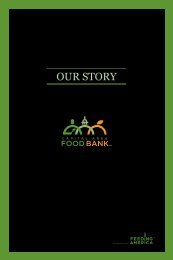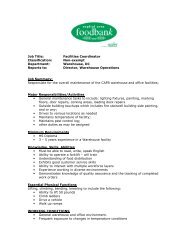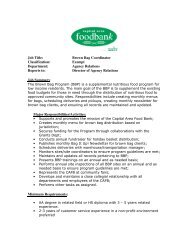Thirty Years Later, CAFB Still In Demand - Capital Area Food Bank
Thirty Years Later, CAFB Still In Demand - Capital Area Food Bank
Thirty Years Later, CAFB Still In Demand - Capital Area Food Bank
Create successful ePaper yourself
Turn your PDF publications into a flip-book with our unique Google optimized e-Paper software.
<strong>CAFB</strong> Programs Help Partner Agencies<br />
Respond to Rise in Hunger<br />
The St. Camillus food pantry utilizes the<br />
Client Choice Model, which allows clients<br />
to select the food they want and adds<br />
a level of dignity to the food distribution<br />
process.<br />
Last year, the <strong>Capital</strong><br />
<strong>Area</strong> <strong>Food</strong> <strong>Bank</strong> and<br />
Feeding America conducted<br />
the study Hunger <strong>In</strong><br />
America 2010, a report on<br />
emergency food distribution<br />
in the United States.<br />
By the end of April 2009,<br />
79 volunteers conducted<br />
421 client interviews and<br />
collected 385 surveys from<br />
partner agencies revealing<br />
a painful picture of people<br />
laboring under tenuous<br />
circumstances.<br />
The results of the study<br />
revealed a 25 percent<br />
increase in the number of<br />
clients served by the food<br />
bank and told the story of<br />
lives irrevocably changed by<br />
the pain of hunger; and<br />
the heroic efforts of our nonprofit partner agencies who attempt<br />
to address that pain daily.<br />
The food bank coordinates several programs that directly impact<br />
its partner agency’s food distribution programs including the<br />
Mobile Pantry Program, USDA Commodities, Senior Brown Bag<br />
Program, Hunger Lifeline and the Agency Achievement Academy.<br />
<strong>In</strong> Washington, D.C., Allen Chapel Outreach is one such agency<br />
serving the community with a <strong>CAFB</strong> model program. Twice each<br />
month, they operate as one of 41 mobile pantries coordinated by<br />
the food bank, serving over 500 households each month. Clients<br />
arrive as early as 6:30 AM to secure a place in line; and volunteers<br />
work tirelessly in the heat and the cold to ensure people are<br />
served quickly. McKinley Crudup, director of Allen Chapel’s food<br />
distribution, notes the importance of the mobile food pantries. “I<br />
know what it means to be hungry and if I can help, I want to do all<br />
I can.”<br />
St. Camillus Church is another nonprofit partner agency operating<br />
two emergency food pantries located in Montgomery County<br />
– serving 200 families monthly. Joan Conway is the director of<br />
services at both pantries and has seen firsthand the heightened<br />
demand for services. “It took us two years between 2006-2008<br />
to serve 1,000 families; this past year we have served 1,000 families<br />
in the months of November through March, 2009.”<br />
The St. Camillus food pantry has touched the lives of many<br />
including a former landscaper unable to work because of medical<br />
issues. His wife’s $500 monthly income went towards his medical<br />
expenses, leaving the family unable to pay rent. The family<br />
eventually found relief at the St. Camillus food pantry.<br />
Right here at the food bank, the Hunger Lifeline refers people in<br />
crisis to emergency food pantries like the two aforementioned<br />
agencies. Last year, calls to Hunger Lifeline increased 71%,<br />
having referred 2494 individuals to area food pantries. “I receive<br />
many phone calls from first time callers, who thought they would<br />
never be in a situation where they would be in need of food.<br />
These clients have often been on the other side of this service<br />
where previously they were volunteering or even donating funds<br />
to help those who were in difficult times,” says Andrea McCarthy,<br />
Hunger Lifeline coordinator.<br />
While the demand for food assistance continues to mount, the<br />
<strong>Capital</strong> <strong>Area</strong> <strong>Food</strong> <strong>Bank</strong>’s various programs and services ensure<br />
that partner agencies, such as Allen Chapel and St. Camillus,<br />
can continue to sufficiently meet clients’ needs.<br />
- Marian Barton Peele, Director, Agency Relations<br />
Deloitte Study Helps <strong>Food</strong> <strong>Bank</strong> Target <strong>Area</strong>s in Need<br />
new study completed by Deloitte LLP for the <strong>Capital</strong> <strong>Area</strong><br />
A <strong>Food</strong> <strong>Bank</strong> identified where the highest concentration of<br />
hunger is and access to affordable food is low in the Washington<br />
metropolitan region. <strong>In</strong> certain areas of Prince William,<br />
Fairfax and Prince George’s counties, for example, there are<br />
a low number of agencies for the food bank to partner with to<br />
distribute food.<br />
Just to have information on targeted areas certainly enhances<br />
our work and makes it easier,” says Lynn Brantley, president<br />
and CEO of the <strong>Capital</strong> <strong>Area</strong> <strong>Food</strong> <strong>Bank</strong>.<br />
The results of the study were revealed June 11th during Deloitte’s<br />
Impact Day, an annual service day where Deloitte’s 3,500<br />
personnel volunteer at 65 projects to help D.C. area nonprofits.<br />
The pro bono study, which would have cost the food bank<br />
thousands of dollars to conduct, will help the <strong>CAFB</strong> determine<br />
efficient ways to increase food distribution to areas in need.<br />
The food bank currently distributes 25 million pounds of food<br />
to families and individuals in need, but wants to increase that<br />
amount to 30 million pounds this coming year.<br />
The study also highlighted the effects of migration of food<br />
distribution. As more people move to rural areas, the food<br />
bank is challenged with putting the right distribution channels<br />
in place to address needs in those locations.<br />
“As we look at what is continuing to happen with D.C.,<br />
especially in Wards 7 and 8, people are beginning to move out<br />
to Prince George’s County,” says Linda Solomon, principal at<br />
Deloitte Consulting and <strong>CAFB</strong> board member. “You are going<br />
to see more and more people living in areas that may be in<br />
need.”<br />
Deloitte has been a valued community partner of the food<br />
bank – serving on the board of directors, participating in key<br />
food bank initiatives and volunteering in our warehouse.<br />
Consulting firm Deloitte will help the <strong>CAFB</strong> efficiently distribute food to areas<br />
where need is high and access to affordable food is low.<br />
8












